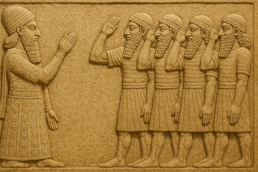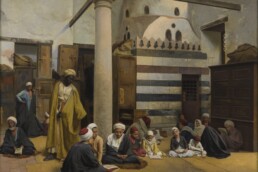In the English language, the noun convert refers to a person who has changed his/her modern religion. But the word revert has no such theological connotation. It isn’t used as a noun, and as a verb simply means to return to a previous state. Applying it to those who truly submit to God as God expects is not only a linguistic aberration, it is also theologically incorrect. For those who attempt to draw on references, it is essentially an unsound understanding of shar’ī sources.
Here are a few brief reasons:
1. The Prophet’s famous statement: “Every child is born on fitrah” does not mean that the entire humanity is born into a “religion” and then reneges on it, but that every soul is created with godly subservience coded into its existential DNA. The hadith does not say that they were actually in a state of intentional subservience which the Arabic verb aslama means. Scholars of the past have also had similar things to say: al-Nawawi wrote on this hadith, “The correct meaning is that every child is born predisposed submitting to God,” and not that it already has. Ibn Al-Qayyim wrote (in Shifā al-Alīl), “It should be noted that when it is said that he is born on ‘fitrah‘ (natural coding), or on ‘islam‘ (true submission), or ‘on this dīn’ (code), or created ‘hanīf’ [all the different variants of the narration], it does not mean that when he came out of his mother’s womb that he knows this faith and desires it, for God says: “God brought you out off your mothers’ wombs; you knew nothing.”‘
2. The absurdity is that to say they reverted is to say they initially believed, then reneged (irtadda) on their faith, and now believe again! So every non-Muslim today is really an apostate?! Obviously not. Whenever anyone submitted to God, neither God nor His messenger Muhammad put it that he re-submitted (أسلم مرة أخرى), reverted (عاد/رجع) or renewed his submission (جدد إسلامه). The key word for those who convert and submit to God is أسلم (aslama) which holds absolutely no suggestion of returning. We find in revelation:
- “They think they have done you a favour by submitting (aslamu). Say, ‘Do not consider your submission a favour to me; it is God who has done you a favour by guiding you to faith, if you are truly sincere.’” (49:17) Note that God does not say ‘re-submission’.
- Qais b. Āsim said: “I came to the Prophet and I wanted to submit, so he commanded me to bathe with water and sidr.” (al-Tirmidhī) Note that Qais did not say “I wanted to resubmit/revert.”
3. As for Jews or Christians who then receive the final message, they do not revert. They progress to the update – having shown their submissive nature throughout. In this sense, they have always been muslim (submissive). God mentions this point explicitly: “Those to whom we gave the scripture believe in it (this message), and when it is proclaimed to them, they say: ‘We have faith in it, it is the truth from their Lord. Before it came we had already been submissive to him (muslimīn). They will be given their rewards twice over…” (28:52-54) In the hadith of Abū Mūsa al-Ash’arī compiled by al-Bukhāri and Muslim which further shows that in such cases it can be argued that no conversion is actually taking place, the Prophet said: “There are three who shall be rewarded twice over: A person who affirms his Prophet and then affirms me…”
4. It seems that many people misunderstand the hadith on fitrah and come to inaccurate theological conclusions. I sympathise with the laity who might have been told that this is a cogent idea, but it’s mind-boggling that this misunderstanding has persisted for so long.
5. Additionally they have come to incorrectly use the English language and warp it to conform to a fabricated Muslim identity. Linguistically, reversion is synonomous with regression and given that believers ought to be portraying themselves as a learned bunch, it really isn’t a good look in wider society – fundamentally it is linguistic incompetence.
6. Perpetual references to the faithful as converts has no theological or legal value, in British practice it merely acts as an ethnic indicator mainly comprising of South Asians.




